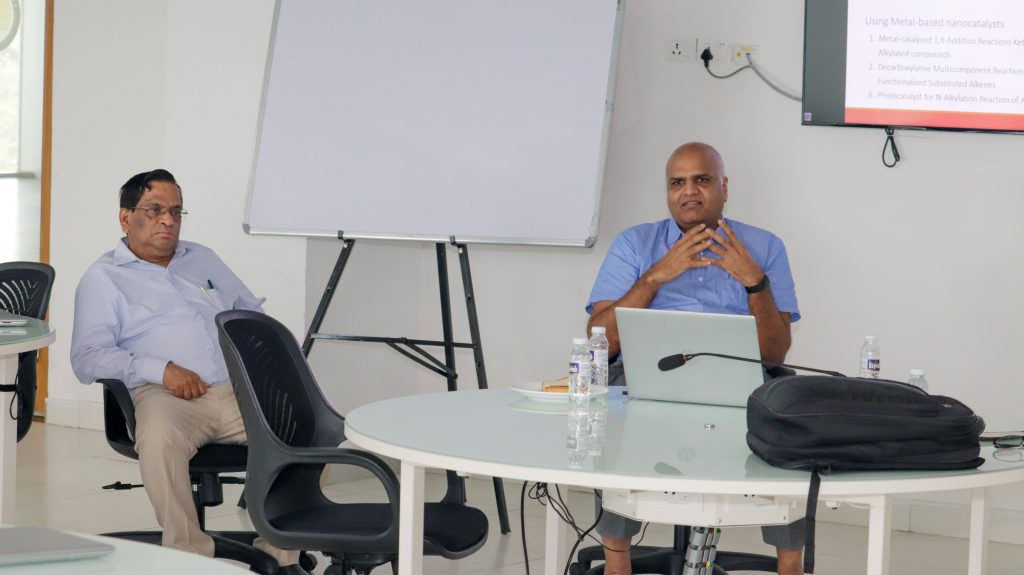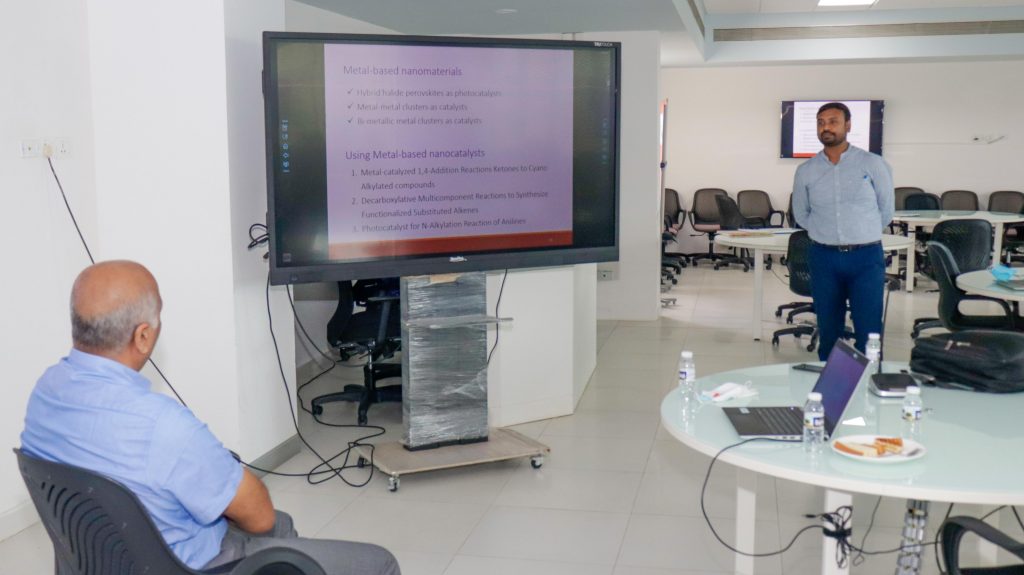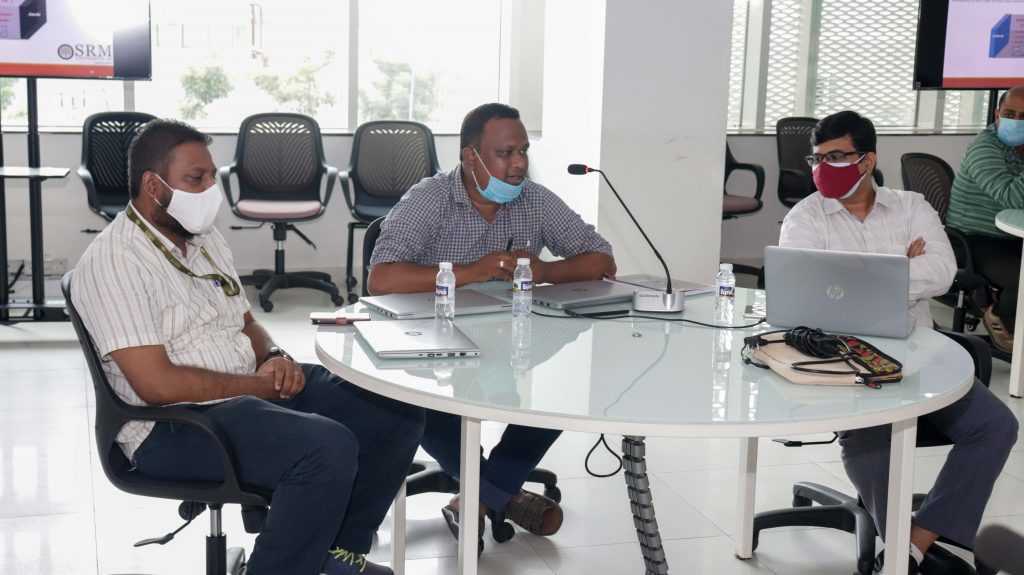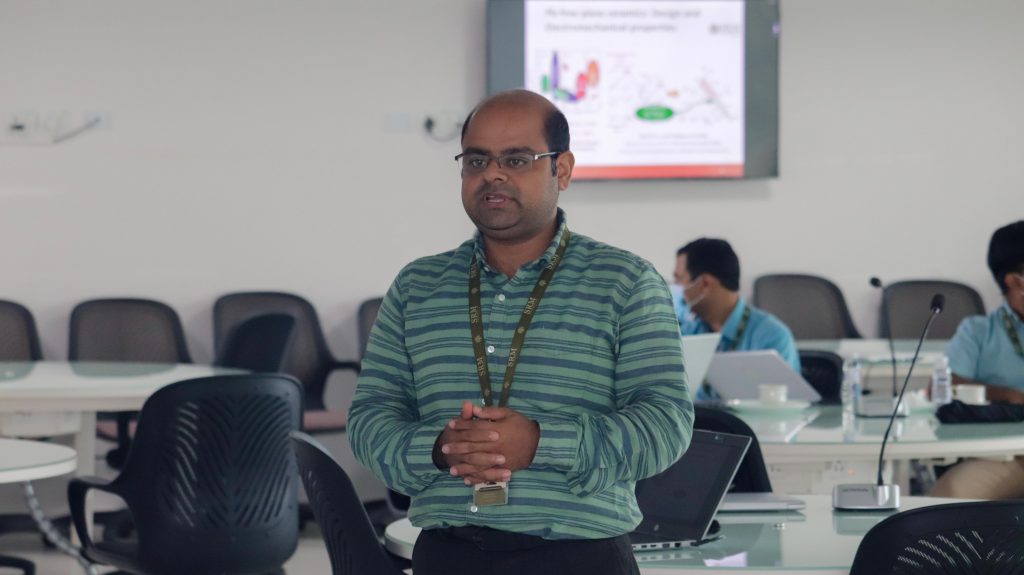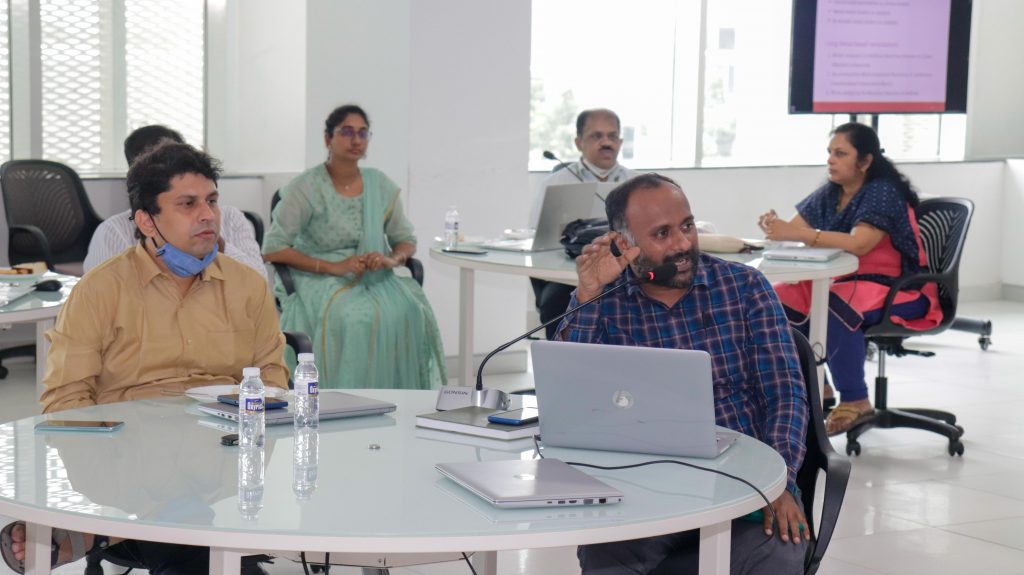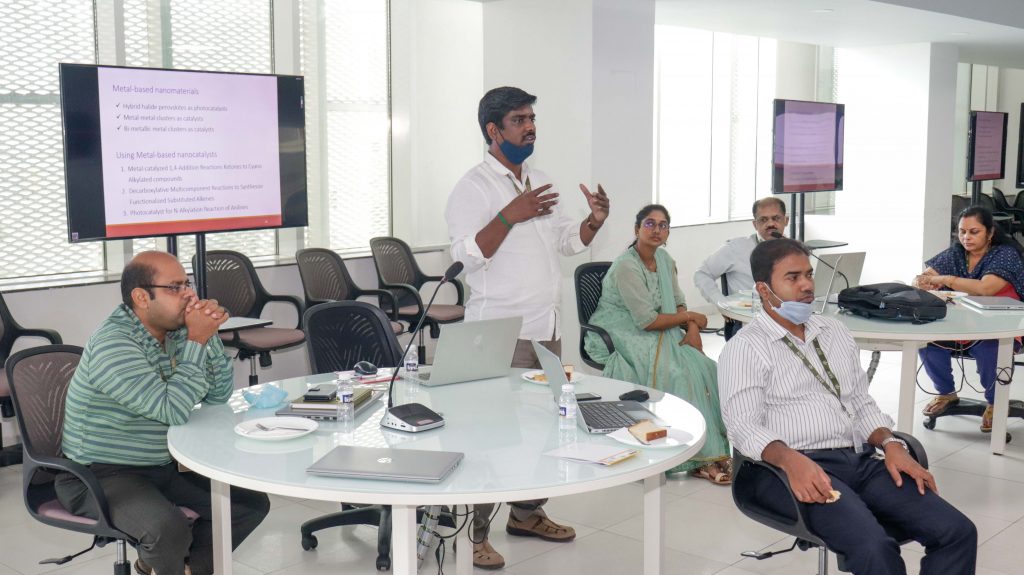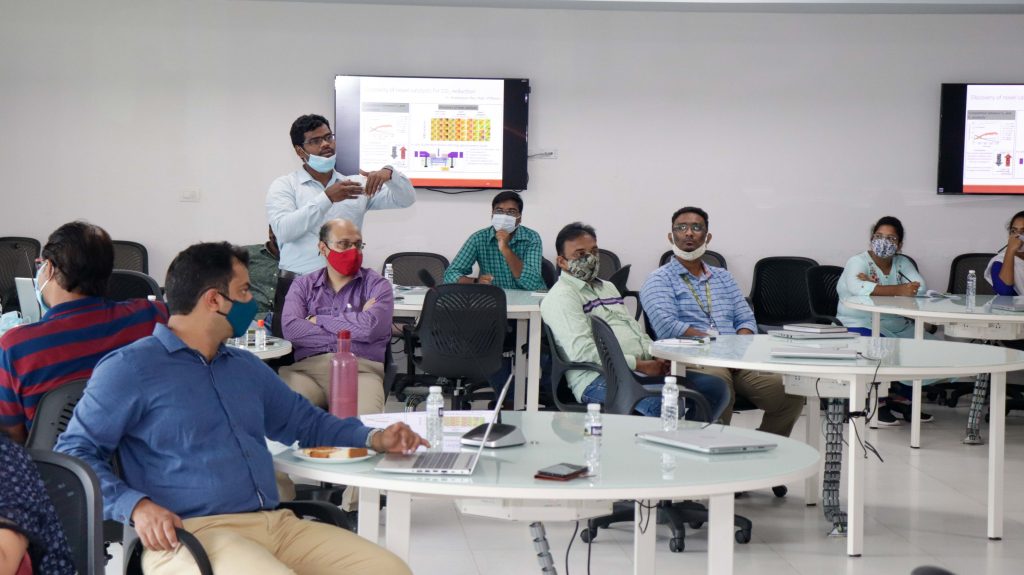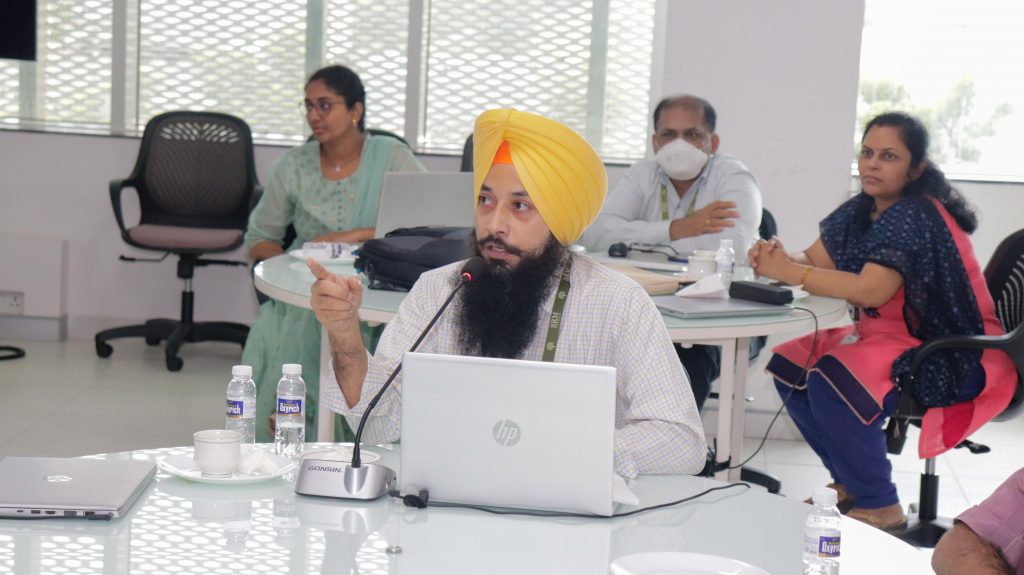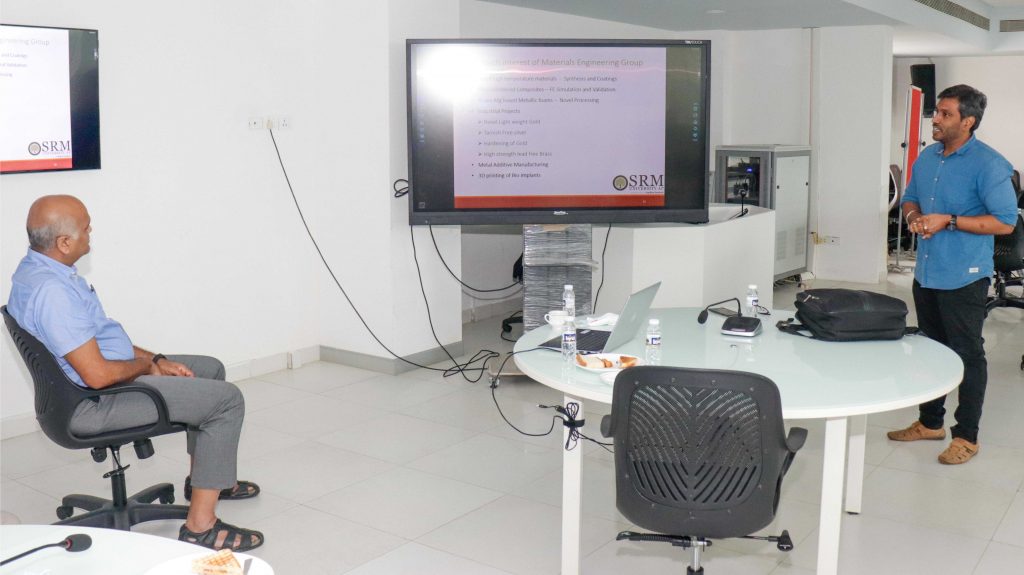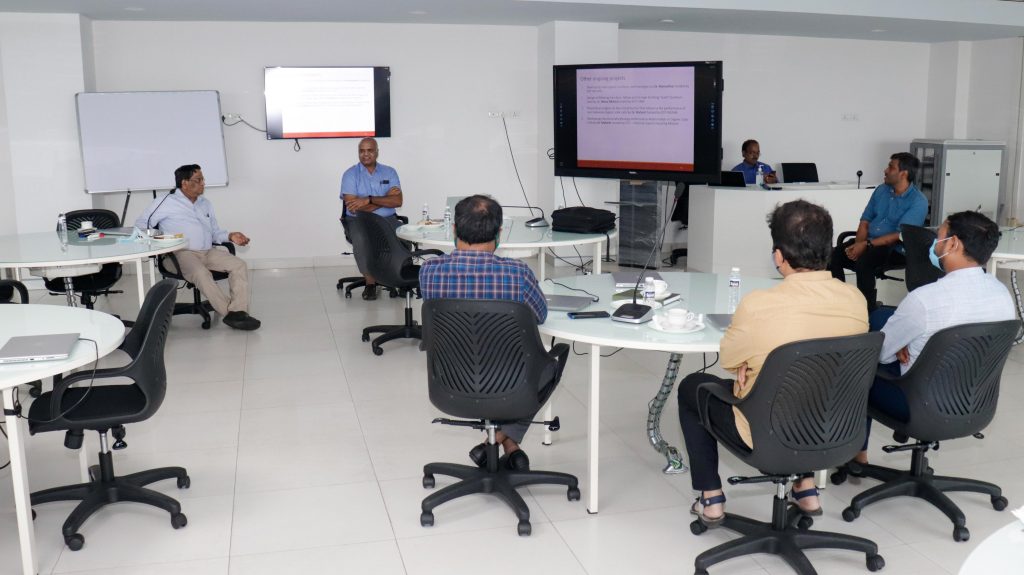SRM-AP All News
ALL News
- Simple and portable spectrochemical probe for rapid detection of chlorides ions in water September 8, 2021
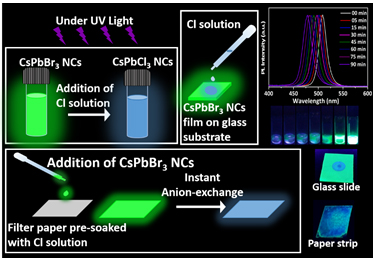 Dr Nimai Mishra, Assistant Professor, Department of Chemistry, SRM University-AP, Andhra Pradesh, along with his research group comprising of students pursuing PhD under him, Ms V.G.Vasavi Dutt and Mr Syed Akhil has published a research article titled Cesium Lead Bromide Perovskite Nanocrystals as a Simple and Portable Spectrochemical Probe for Rapid Detection of Chlorides in the Journal ChemistrySelect (Publisher: Wiley-VCH on behalf of Chemistry Europe, Impact Factor-2.2).
Dr Nimai Mishra, Assistant Professor, Department of Chemistry, SRM University-AP, Andhra Pradesh, along with his research group comprising of students pursuing PhD under him, Ms V.G.Vasavi Dutt and Mr Syed Akhil has published a research article titled Cesium Lead Bromide Perovskite Nanocrystals as a Simple and Portable Spectrochemical Probe for Rapid Detection of Chlorides in the Journal ChemistrySelect (Publisher: Wiley-VCH on behalf of Chemistry Europe, Impact Factor-2.2).Chloride anions are widely abundant in water and when they combine with calcium, potassium, and magnesium, they form chloride salts. However, the higher concentrations badly affect the environment by causing severe dehydration and even plant death. High concentrations of sodium chloride exhibit the potential of corrosive damage thereby releasing toxic metals from plumbing fixtures. Hence, there is a need to monitor the concentration levels of chloride salts in water. Several techniques like titration, spectrophotometry, ion chromatography, electrochemistry, etc have been reported to date. Despite the high accuracy and precision of these techniques, they involve expensive instrumentation and is out of reach from on-site detection. Hence, it is necessary to look for simple, portable, and cost-effective strategies for the detection of chlorides in the water.
In this article, Dr Mishra’s research group demonstrated that the wide spectral tunability of CsPbBr3 perovskite nanocrystals (NCs) via instantaneous and facile anion exchange, make them a suitable candidate for chloride detection. Rapid anion-exchange processes between CsPbBr3 perovskite NCs and different chloride solutions were carried out in ambient conditions. The resultant anion-exchanged CsPbCl3-xBrx NCs preserved the structural properties and exhibited a remarkable blue shift in photoluminescence spectra. This forms a basis for the detection of chloride ions in water. This has been applied with the limit of detection up to 100 µM. The detection strategies were not only limited to the direct addition of chloride solutions to NCs, but they also showed a visual colour change under UV light when the chloride solution is drop-casted on CsPbBr3 films that are deposited on glass substrates. Furthermore, the detection strategy is established by drop-casting CsPbBr3 NCs onto paper strips that are pre-soaked in chloride solutions. A considerable blue shift in fluorimetry proves them to be an excellent sensing medium as practical spectrochemical probes for on-site detection of chlorides. Based on this, a colour chart and selectivity chart to access the presence of chlorides and their concentration is also demonstrated.
Continue reading → - Prof U Ramamurty, renowned researcher from NTU Singapore, visits SRM University-AP September 7, 2021
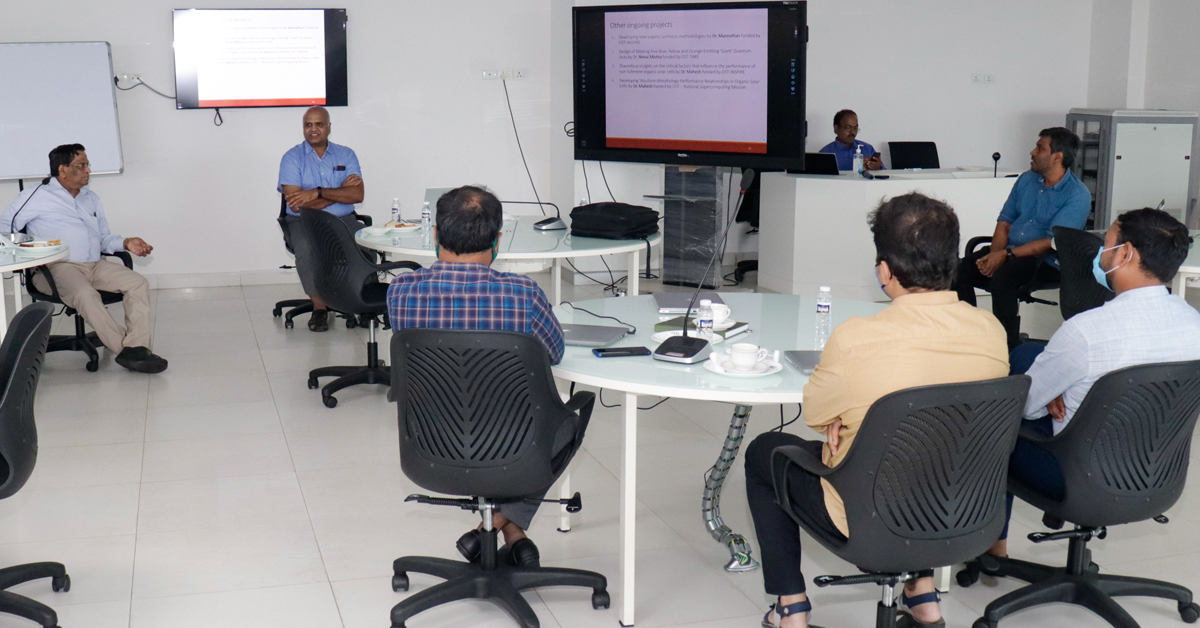 An interactive session between Prof U Ramamurty, President Chair Professor, School of Mechanical & Aerospace Engineering at Nanyang Technological University (NTU), Singapore, and the faculty members of SRM University – AP, Andhra-Pradesh was held on Monday.
An interactive session between Prof U Ramamurty, President Chair Professor, School of Mechanical & Aerospace Engineering at Nanyang Technological University (NTU), Singapore, and the faculty members of SRM University – AP, Andhra-Pradesh was held on Monday.During the discussion, Prof Ramamurty emphasized the importance of research collaboration between faculty members from different research areas and about utilizing expertise to achieve significant scientific output.
Dr Pardhasaradhi Maram from the Department of Chemistry, Dr Sabyasachi Mukhopadhyay from the Department of Physics, and Prof G S Vinod Kumar from the Department of Mechanical Engineering presented their detailed research areas that focus on storage devices, catalysts for value-added products, energy and sensing devices, novel metallic materials, additive manufacturing of metals and Bio-implants, and industry collaborative research work.
Prof Ramamurty said that he is glad to see that productive science is being done at SRM University-AP. “Given that the University has started only 4 years ago and been functioning amidst a pandemic for more than one and a half years, the progress in research is significant and very impressive. Interdisciplinary efforts between various departments in the University will give effective results”, he added.
Prof D Narayana Rao, Pro-Vice-Chancellor, SRM University – AP expressed his interest in establishing NTU – SRM joint Centre for Advanced Research in functional and structural materials at SRM University campus to Prof Ramamurty. The centre that Prof Rao envisions will provide an opportunity to synergize the expertise and resources of NTU, Singapore, and SRM University – AP to carry out front-line research in the areas of novel materials, self-healing materials and also additive manufacturing (3D Printing of metals and bio-implants).
Continue reading → - Cost-effective electro-catalyst for oxygen reduction reaction September 6, 2021
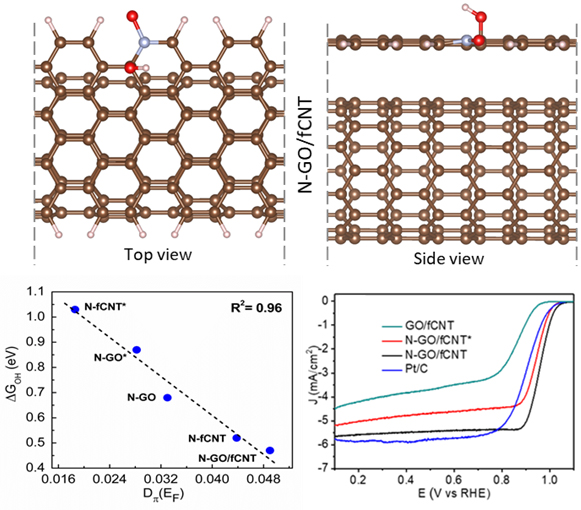 A research paper titled “Nitrogen doping derived bridging of Graphene and Carbon Nanotube composite for oxygen electroreduction” has been published by Prof Ranjit Thapa, Professor of Physics, SRM University – AP, as a co-author, in International Journal of Energy Research, having Impact Factor of 5.164.
A research paper titled “Nitrogen doping derived bridging of Graphene and Carbon Nanotube composite for oxygen electroreduction” has been published by Prof Ranjit Thapa, Professor of Physics, SRM University – AP, as a co-author, in International Journal of Energy Research, having Impact Factor of 5.164.In this work, the research group investigated the origin of high catalytic activity of oxidic-N configuration in nitrogen-doped CNT and graphene heterostructure using density functional theory (DFT). We have plotted the free energy profile of the oxygen reduction reaction (ORR) to estimate the thermodynamic overpotential and catalytic performance of the respective active sites. The overpotential is related to the quantifying parameter ∆GOH (with R2 = 0.98) and the π electron density at the Fermi level, defined as an electronic descriptor, which is highly correlated with the ∆GOH with R2 value 0.96. For various N doped configurations, we correlated the ∆GOH values with π electron density at the Fermi level and found that the carbon site adjacent to the oxide-N configuration is a more prominent site for ORR. Further, we show that the oxidic-N configuration in the heterostructure of graphene and CNT is the ideal configuration, which gives a lower overpotential of 0.54 eV for ORR on adjacent carbon sites. Therefore, the charge transfer occurs from underneath CNT to graphene and increases the value of π electron density at the Fermi level which leads to the higher catalytic performance of the active site.
In the early 20th century, fuel cells were invented and their global impact has not reached up to its regular commercialization when compared with battery technology. The fuel cell device could be a powerful technique to generate electricity for large energy demand without greenhouse gas emissions. However, other major hurdles in the commercialization of fuel cell devices are the cost of platinum (as a catalyst), its poisoning and stability. Recently, carbon-based materials such as graphene, carbon nanotubes and activated carbon have been evolved as metal-free low-cost catalysts due to their (i) high abundance/yield (ii) reactivity towards oxygen just by introducing impurities like heteroatoms or other metals. However, identifying an efficient design principle to search optimal doping configurations in various carbon systems is a grand challenge for researchers.
This work is done in collaboration with Research Institute, SRM Institute of Science & Technology, Kattankulathur-603203, Chennai (India).
In future, the study aims to propose the effective design principle for various doped carbon systems as a catalyst to identify the optimal active sites and configurations for ORR. The role of π orbital in carbon systems such as graphene, graphene nanoribbons, carbon nanotube, etc is very important and can be a general electronic descriptor to define catalytic activity. Also, π electron descriptors and machine learning algorithms based combined approach can boost the search for ideal carbon catalyst for ORR with low DFT cost.
Read the full paper here: https://doi.org/10.1002/er.7179
Continue reading → - Undergraduate gets placed in Danske IT, a fully owned subsidiary of Danske Bank September 3, 2021
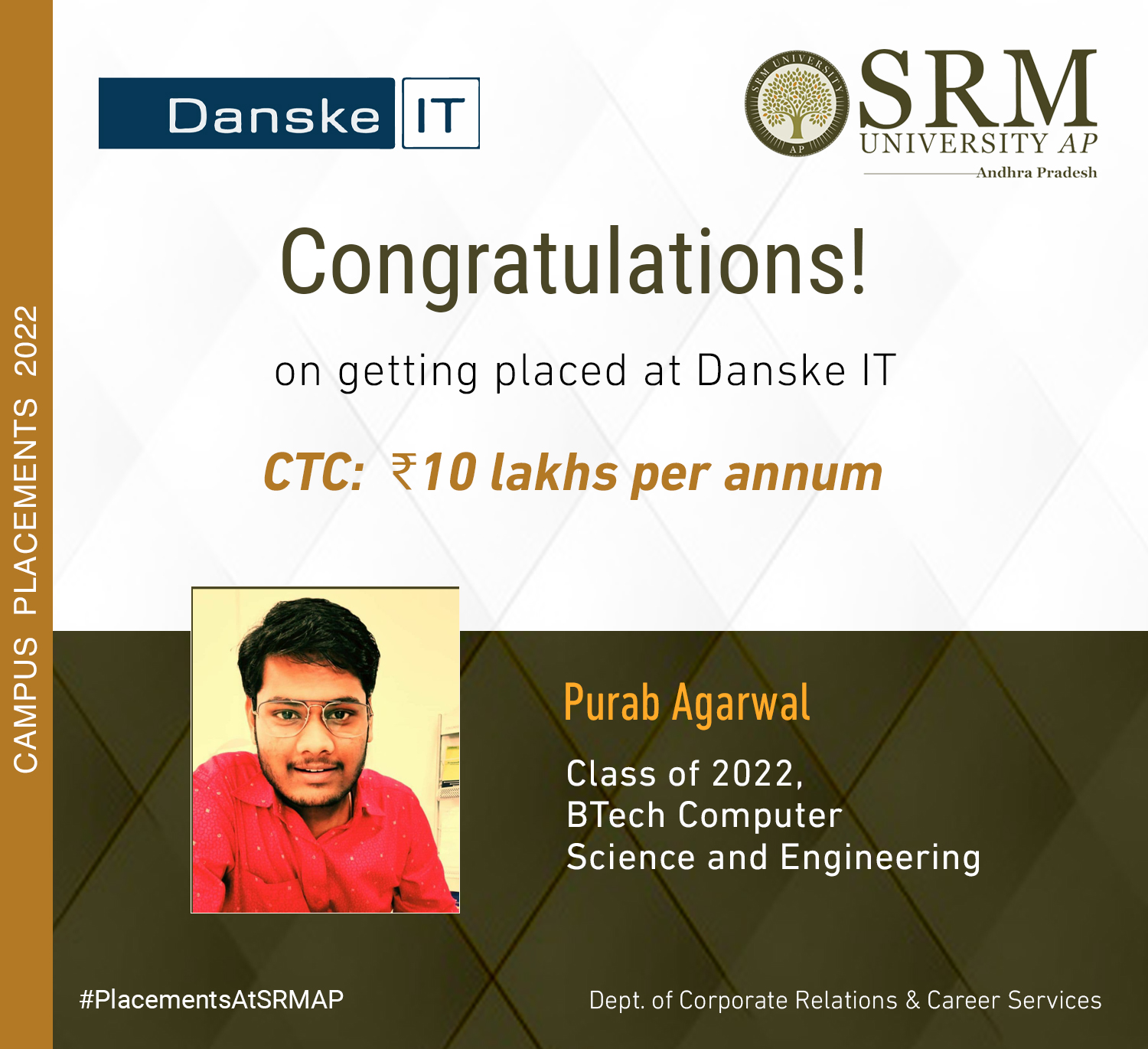 Purab Agarwal from the Department of Computer Science and Engineering has been successfully placed at Danske IT, a fully owned subsidiary of Danske Bank with an exciting CTC of 10 LPA. The company is headquartered in Bengaluru.
Purab Agarwal from the Department of Computer Science and Engineering has been successfully placed at Danske IT, a fully owned subsidiary of Danske Bank with an exciting CTC of 10 LPA. The company is headquartered in Bengaluru.Danske IT, which has been in operation since 2015, is a fully owned subsidiary of the Danske Bank Group, Denmark’s largest bank and a leading bank in Northern Europe with a global presence. Danske IT is dedicated to providing cutting-edge, end-to-end solutions to clients by providing value through high-performing teams. They are also committed to assisting Danske Bank in realising its goal of becoming the most trusted financial partner in the world.
Purab Agarwal with overwhelming joy narrates his experience at SRM University-AP. “I was good in academics from the beginning of my degree. I believe that the curriculum helped me in enhancing my knowledge of different domains. It showed me a direction to what I need to pursue. CCC training organised by the placement cell of the university helped me a lot in my preparation. I had earlier also been shortlisted for ABInbev, Sahaj, Nielsen, and Bajaj Finserv. My advice to juniors would be to always be curious and humble.
Continue reading → - CRIDAP appoints Dr Ghanshyam Pandey as an expert for agriculture September 3, 2021
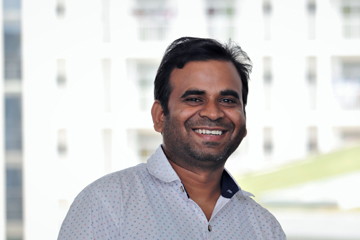 Dr Ghanshyam Pandey, Assistant Professor of Economics, SRM University – AP has been appointed as an expert for agriculture, rural development, livelihood issues, and climate change and agriculture by The Centre of Integrated Rural Development for Asia and Pacific (CRIDAP). CRIDAP is an intergovernmental and autonomous organization and has 15 member countries. The member countries are Afghanistan, Bangladesh, Fiji, India, Indonesia, Iran, Lao PDR, Malaysia, Myanmar, Nepal, Pakistan, Philippines, Sri Lanka, Thailand, and Vietnam. His tenure of appointment will be up to 2024.
Dr Ghanshyam Pandey, Assistant Professor of Economics, SRM University – AP has been appointed as an expert for agriculture, rural development, livelihood issues, and climate change and agriculture by The Centre of Integrated Rural Development for Asia and Pacific (CRIDAP). CRIDAP is an intergovernmental and autonomous organization and has 15 member countries. The member countries are Afghanistan, Bangladesh, Fiji, India, Indonesia, Iran, Lao PDR, Malaysia, Myanmar, Nepal, Pakistan, Philippines, Sri Lanka, Thailand, and Vietnam. His tenure of appointment will be up to 2024.Dr Ghanshyam Pandey’s role in the organisation:
- CIRDAP resource person to participate in project proposal development and consultancy.
- CIRDAP resource person for flagship training courses.
- Reviewer of Asia-Pacific Journal on Rural Development (APJORD).
- Part of CIRDAP Think Tank for knowledge sharing and solutions to IRD and PA.
- To expand CIRDAP Think Tank Networks.
- To advise on refining CIRDAP Strategic Plan 2020-2024.
About the organisation:
Continue reading →
The Centre on Integrated Rural Development for Asia and the Pacific (CIRDAP) is a regional, intergovernmental and autonomous organisation. It was established on 6 July 1979 at the initiative of the countries of the Asia-Pacific region and the Food and Agriculture Organization (FAO) of the United Nations with support from several other UN bodies and donors. The Centre came into being to meet the felt needs of the developing countries at that time as an institution for promoting integrated rural development in the region. From the original six members, CIRDAP has now grown up as a Centre of 15 member countries. The member countries are Afghanistan, Bangladesh (Host State), Fiji, India, Indonesia, Iran, Lao PDR, Malaysia, Myanmar, Nepal, Pakistan, Philippines, Sri Lanka, Thailand and Vietnam. Operating through designated contact ministries and link institutions in member countries, CIRDAP promotes regional cooperation. It plays a supplementary and reinforcing role in supporting and furthering the effectiveness of integrated rural development programmes in Asia and the Pacific. - $1750 cash prize awarded to Team Hexagon at the International Hackathon 2021 September 2, 2021
Yuvraj Tankala and Joseph K Paul from the Department of Computer Science and Engineering, SRM University-AP has successfully bagged a cash prize of $1750 at the Datastax Hackathon held from Dec 2020 to Feb 2021. The duo formed the “Team Hexagon” and demonstrated their full-stack AI monitored online classroom and examination portal project at the international competition conducted by Datastax. It powered the innovative data apps to the Home Depot, T-Mobile, Intuit, and half of the Fortune 100 companies.
Rakuten India Enterprise Private Limited conducted this 24-hour challenge competition amongst 7000+ participants. Based on three rounds- 1) Ideation Phase 2) Build Phase 3) Finals-winners were decided. Each team comprised of one to four members and they were allotted various themes such as Mobile and Web Development, Web Analytics, Platform Development and Backend Engineering, Data Science, Machine Learning and Artificial Intelligence.
While briefing on the project, Team Hexagon elucidated, “We were excited to participate in the competition and immediately started working on the project. After outlining the base of the project, we were assured that it could create a positive impact during this unprecedented time of Covid-19 outbreak. The education system is facing tough times while managing online assessments. We introduced an AI model-based monitoring system for examiners and examinees involved in the evaluation process. The application follows the head and lip movements of the examinee by considering the various parameters. It tracks the head movement in two axes (up-down and right-left) and warns the examinee to concentrate on the screen. In a similar way, it follows the lip movement and alerts the examiner when found any abnormal movements in between assessment”.
Yuvraj and Joseph presented their project before Technology Business Incubator’s panel, which was shortlisted from 34 other proposals. Under this programme, they went under rigorous training for 12 months and received the felicitation of industry support, seed funding, innovation fund support, industry connectivity with the key players in the market. Winning over the competitive challenges has given the duo high confidence to work on multiple projects and plan to lead off a venture after the completion of academic years.
Continue reading → - First patent granted to SRM University-AP September 1, 2021
Title of the Patent: A Process for Preparing Magnesium Foams
Patent applicant: SRM University-AP, Andhra Pradesh
Patent Application number: 202041001715
Date of Filing: 14/01/2020
Date of Publication: 24/01/2020
Date of Grant: 16/08/2021
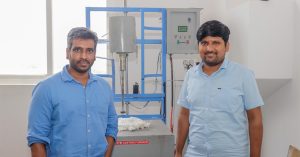 Prof G S Vinod Kumar and his PhD Scholar Mr Dipak Nandkumar Bhosale from the Department of Mechanical Engineering has brought the first granted patent to SRM University-AP. The patent titled “A Process for Preparing Magnesium Foams” is on the novel processing of Magnesium alloy foams via molten metal route. Metal foams are the class of novel ultra-lightweight and high strength materials used for engineering structures. Under the light-alloy category, Magnesium alloys possess greater challenges to foam and the inventors Mr Dipak Bhosale, PhD scholar and Prof Vinod Kumar (PhD supervisor) of Dept. of Mechanical Engineering have come up with a novel process to foam Magnesium alloy effectively. The patent was filed on January 14, 2020, and granted on August 16, 2021. It is indeed commendable that the patent grant is obtained in just 16 months from the date of application.
Prof G S Vinod Kumar and his PhD Scholar Mr Dipak Nandkumar Bhosale from the Department of Mechanical Engineering has brought the first granted patent to SRM University-AP. The patent titled “A Process for Preparing Magnesium Foams” is on the novel processing of Magnesium alloy foams via molten metal route. Metal foams are the class of novel ultra-lightweight and high strength materials used for engineering structures. Under the light-alloy category, Magnesium alloys possess greater challenges to foam and the inventors Mr Dipak Bhosale, PhD scholar and Prof Vinod Kumar (PhD supervisor) of Dept. of Mechanical Engineering have come up with a novel process to foam Magnesium alloy effectively. The patent was filed on January 14, 2020, and granted on August 16, 2021. It is indeed commendable that the patent grant is obtained in just 16 months from the date of application.Metal foam is a cellular structure consists of solid metal with gas-filled pores. The pores can be sealed (closed-cell foam) or interconnected (open-cell foam). The present patent relates to a process for the preparation of closed-cell Magnesium foams using dolomite [CaMg (CO3)2] as a blowing agent (gas source), through a liquid metal route. The inventors have demonstrated economical and naturally occurring mineral dolomite to be an effective blowing agent for preparing magnesium foams and in-situ formed MgAl2O4 (spinel) particles as the stabilizing agent during stabilization of foams. The Magnesium foams produced by the process of the present disclosure have a good expansion, lower density, uniform pore size distribution and polyhedral pore structure. Through the present process Magnesium foams with 88% porosity 0.20 g/cm3 foam density was obtained. Magnesium foam is an attractive material that exhibits a unique combination of mechanical, physical, thermal, electrical and acoustic properties. It has high strength to weight ratio, good compressive strength and high energy/shock/vibration/sound absorption efficiency. Owing to these properties the magnesium foam finds potential in lightweight structural applications, sound-absorbing, energy and vibration and shock damping application.
Continue reading → - Inauguration of Freshmen Orientation Programme-2021 August 26, 2021
The grand virtual inauguration of the Freshmen Orientation Programme-2021 took place on August 25, 2021, at 2.30 pm. Dr P Sathyanarayanan, President; Prof V S Rao, Vice-Chancellor and Prof D Narayana Rao, Pro-Vice-Chancellor, welcomed the freshers into the university. The Orientation Programme will be continued till September 07, 2021.
In the Presidential address, Dr Sathyanarayanan asserted SRM University’s latest achievements in Placement, Higher Studies and Entrepreneurship. Unlike many other universities, which concentrates on producing job-seeking graduates, SRM University-AP prefers to deliver job providers. Thus, this university gives grave emphasis on Entrepreneurial and Innovative activities. The university is proud of its budding entrepreneurs, founders of OurEye.ai, who secured an angel investment of $120000. SRM University-AP is unique in many ways, and that is one of the reasons that attract meritorious students to the university. SRM University-AP further offers special scholarships for brilliant students. The university gives equal importance to Placement, Higher Studies and Entrepreneurship to support the students in realising their dreams and potential. Dr Sathyanarayanan believes that talent, discipline and opportunity can change a student’s future, provided he/she makes good use of it. “Stress on the hard work, capitalise your talent with SRM University-AP’s experiential programme to find success at your doorstep,” advised Dr Sathyanarayanan.
In his address, Prof V S Rao emphasised on the transition from the School to the University system. The known world is going to change, many of the things students will be experiencing for the first time – be it hostel living or continual internal evaluation instead of annual exams. Prof Rao further explained the importance of a multidisciplinary approach in education and research. Following the recommendation of National Education Policy-2020, SRM University-AP highly stresses on interdisciplinary learning. Time management is another critical factor that is going to affect the students. With the aim to provide holistic education, the university also puts an emphasis on extra-curricular and co-curricular activities. Starting from various clubs and societies to the learning of international languages, SRM University-AP provides many opportunities to the students. One of the distinctive features of the university is that the students can design their future here. From the choice of courses to the choice of careers, SRM University-AP provides support at every level to the students.
In the concluding remarks, Prof D Narayana Rao delved into the importance of innovation and research. Every nation, who aspires to acquire global leadership, has to be very sound in science and technology. India is now one of the top 5 emerging economic powers in the world. The responsibility lies on the shoulders of the next generation of students to take India to the top. With immense passion and willpower, it is possible to witness that achievement.
During the Orientation Programme, eminent personalities from different spheres will be inspiring and motivating students. Prof K N Satyanarayana, Director-Indian Institute of Technology-Tirupati, Dr Jaya Prakash Narayan, Former Secretary to Govt. of Andhra Pradesh, Mr VV Lakshmi Narayana, former JD-CBI, Dr Hanuman Chowdary, Director of Centre for Telecom Management and Studies and Chairman of Pragna Bharati, Padma Bhushan Dr K Varaprasad Reddy, Ms Koka Vijayalakshmi, Prof B S Murty, Director-IIT Hyderabad, will be addressing the students in the fortnight-long programme.
Beyond the motivational lectures, SRM University-AP has organised sessions on Yoga and Meditations in collaboration with Heartfulness Institute to provide holistic development to the students.
Continue reading → - Resource and network-aware data placement algorithm for periodic workloads in cloud August 26, 2021
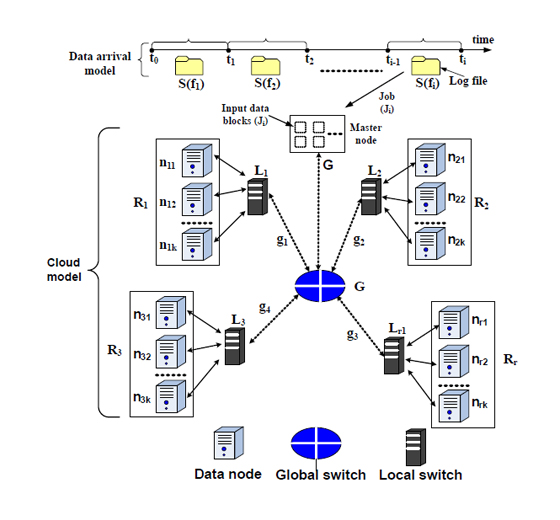 Dr Hirenkumar Thakkar from the Department of Computer Science and Engineering has published a research paper titled “RENDA: Resource and Network-aware Data Placement Algorithm for Periodic Workloads in Cloud” in the journal IEEE Transactions on Parallel and Distributed Systems Vol. 32, No. 12, pp. 2906-2920.
Dr Hirenkumar Thakkar from the Department of Computer Science and Engineering has published a research paper titled “RENDA: Resource and Network-aware Data Placement Algorithm for Periodic Workloads in Cloud” in the journal IEEE Transactions on Parallel and Distributed Systems Vol. 32, No. 12, pp. 2906-2920.Each year, tech giants are spending millions of dollars to purchase the resources to store the data. However, efficient data placement is a critical issue for companies that experience several terabytes of data generation on daily basis. With such speed of data generation, it is the need of the hour to come up with a strategy for an efficient storage mechanism. This research investigates the data placement problems in cloud data centres and assists several tech giants such as Google, Facebook etc., to manage the cloud resource properly.
This research benefits society with a lower cost of cloud subscriptions, as tech giants are able to save several thousands of dollars by means of an efficient storage mechanism. This ultimately enables the tech giants to offer cloud service subscriptions at a reasonable cost.
The study was carried out in collaborations with Artificial Intelligence and Big Data Computing Lab (ABC Lab), Chang Gung University, Taiwan with Prof. Prasan Kumar Sahoo and in collaboration with Prof. Bharadwaj Veeravalli from the National University of Singapore. In addition to the current collaboration, there are several collaborations with the Indian Institute of Technology (IIT-BHU) as well as the University of Tartu, Estonia.
In future, Dr Thakkar is planning to come up with a book on cloud resource management using Nature-inspired learning. In addition to that, there are few projects such as filing two separate patents on Healthcare data analysis and opinion feature mining in collaboration with Chang Gung University, Taiwan, the National University of Singapore, and the University of Tartu, Estonia.
Read the full paper here: https://doi.org/10.1109/TPDS.2021.3080582
Continue reading → - CSE students to transform the future through Accolite Digital August 25, 2021
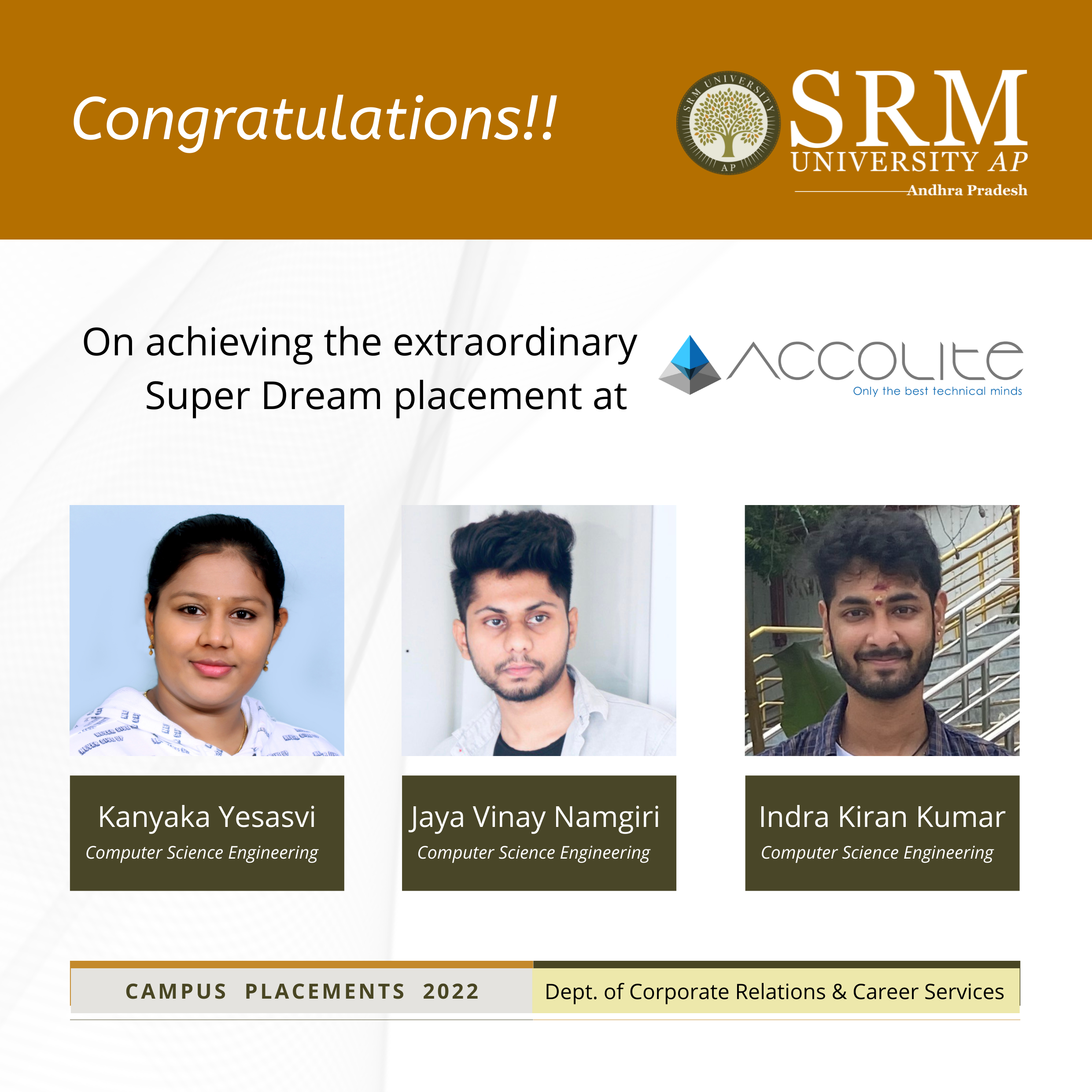 Kanyaka Yesasvi, Jaya Vinay Namgiri, Payeli Indra Kiran Kumar, three vibrant students from the Department of Computer Science Engineering get placed in the reputed digital and product engineering services and solutions company Accolite Digital with an exciting CTC of 11LPA.
Kanyaka Yesasvi, Jaya Vinay Namgiri, Payeli Indra Kiran Kumar, three vibrant students from the Department of Computer Science Engineering get placed in the reputed digital and product engineering services and solutions company Accolite Digital with an exciting CTC of 11LPA.Accolite Digital, founded in 2007, is a cutting-edge, best-in-class digital transformation services company that has successfully delivered design-driven challenging digital transformation efforts to Fortune 500 companies. They accomplish so by using a network of talented and passionate technologists to simplify their clients’ digital journeys through human-centric design and product innovation Accolite Digital is able to generate compelling business outcomes and when applied to any organisation, this encourages cross-team collaboration to drive transformed digital experiences. Their agile product innovation strategy speeds up design and development while offering a high return on investment.
The curriculum of SRM university-AP consists of training for placements beginning from the second year of graduate studies. It helps students to plan for the recruitment drive beforehand. The curriculum of placement consists of CCC training where students are divided into batches given individual attention on respective domains.
Let’s look into what our students say:
Kanyaka Yesasvi:
When I got to know that I received an offer in Accolite Digital as a software engineer I was overwhelmed with happiness. From July till date more than 80 companies visited us. Every day we are applying to multiple organisations through our placement cell. I am grateful to SRM University for giving me extraordinary opportunities to launch my career.Payeli Indra Kiran Kumar:
The CR&CS department gives training on all important aspects required for us to crack the placement, like coding classes, contests, mock interviews, mock GD etc. I started preparing for the interviews using the materials provided by CCC. The faculty in my CSE department helped in all possible ways that they can. I suggest to juniors to make use of all the opportunities provided by the university and learn core subjects like DSA, OS, DBMS and CN for cracking super dream placement offers.Jaya Vinay Namgiri:
Continue reading →
Acceleration bootcamp provided by CCC helped me brush up on my coding skills and made me ready to face the companies in the Placement drive 2022. I thank the placement team for providing a helpdesk virtually in spite of this covid situation. That cleared all my doubts and helped me to plan accordingly. I would like to suggest my juniors develop any one project of their interest every year so that at the end of the third year they will be ready to face the recruitment drive.


